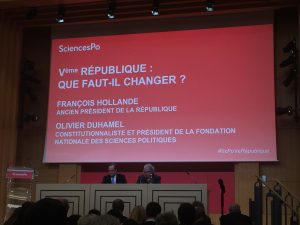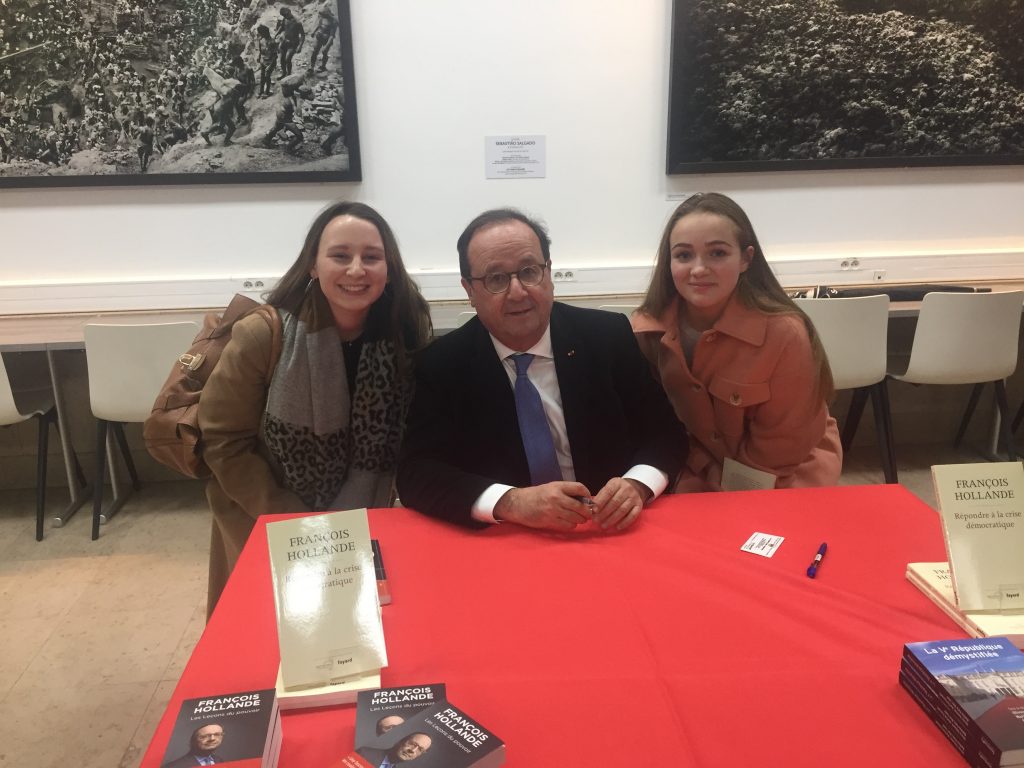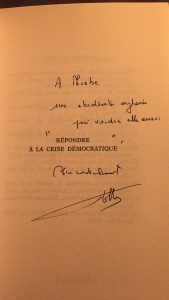Comme si avoir la possibilité d’étudier à Sciences Po Paris ne suffisait pas, on a aussi la possibilité de fréquenter des débats pertinents avec des intellectuels et des personnes extraordinaires.
 Surtout, les deux événements qui m’ont le plus frappée était la conférence donnée par Bruno Patino sur l’actualité française et le débat entre le Président François Hollande et Olivier Duhamel concernant la question : « Vème République, que faut-il changer ? »
Surtout, les deux événements qui m’ont le plus frappée était la conférence donnée par Bruno Patino sur l’actualité française et le débat entre le Président François Hollande et Olivier Duhamel concernant la question : « Vème République, que faut-il changer ? »
Au début de l’année, on a eu la chance d’accueillir Bruno Patino. Il est journaliste avec une expérience marquée de plusieurs médias et publications, notamment de « Le Monde ». Son but a été d’offrir un autre regard sur l’actualité française, particulièrement pour nos étudiants étrangers qui sont en train de commencer de lire les journaux français. Il a démontré comment, et la raison pour laquelle, le Président Macron a bouleversé l’idée que les journaux français devraient s’identifier politiquement. Typiquement, « Le Figaro » est vraiment vers la droite – Gaulliste, mais de l’autre côté « Le Monde » est le quotidien centre – gauche ; cependant, le parti « En Marche ! » sans loyauté spécifique aux journaux, permet un changement du système quasi bipolaire. Même Patino a dit que on a effondré le système partisan en France, en ce qui concerne les actualités, alors il faut faire bien attention en décortiquant des articles politiques.
En plus, il a parlé de l’ombre du terrorisme (particulièrement après les attentats en 2015 et l’accroissement du plan Vigipirate à Paris), la crise des gilets-jaunes comme un mouvement de colère et en générale l’attitude à l’égard de la question environnementale dans les médias français. Patino a montré l’importance d’essayer d’élargir notre lecture en termes des journaux et des sujets.
 D’ailleurs, à l’occasion du lancement de son nouvel ouvrage « Répondre à la crise démocratique », Sciences Po a organisé un débat entre Olivier Duhamel, président de la Fondation nationale des sciences politiques, et l’ancien président de la république (devenu auteur), François Hollande autour de la question de changer le Vème République. Après avoir échangé un peu de moquerie, puisqu’Hollande a aussi passé du temps à Sciences Po, ils ont précisé la diagnostique de la crise démocratique : une crise de légitimité et une crise d’efficacité. Evidemment, le vocabulaire et les sujets politiques étaient très complexes, mais c’était une opportunité superbe de me surpasser en ce qui concerne mon niveau de la compréhension auditive. Hollande a donné des réponses concrètes pour résoudre ces crises à multiniveau (institutionnel, politique et économique) ; il a expliqué qu’il faut protéger le pouvoir des parlementaires et engager les citoyens de plusieurs façons pour faire comprendre aux gens les enjeux, par exemple du populisme.
D’ailleurs, à l’occasion du lancement de son nouvel ouvrage « Répondre à la crise démocratique », Sciences Po a organisé un débat entre Olivier Duhamel, président de la Fondation nationale des sciences politiques, et l’ancien président de la république (devenu auteur), François Hollande autour de la question de changer le Vème République. Après avoir échangé un peu de moquerie, puisqu’Hollande a aussi passé du temps à Sciences Po, ils ont précisé la diagnostique de la crise démocratique : une crise de légitimité et une crise d’efficacité. Evidemment, le vocabulaire et les sujets politiques étaient très complexes, mais c’était une opportunité superbe de me surpasser en ce qui concerne mon niveau de la compréhension auditive. Hollande a donné des réponses concrètes pour résoudre ces crises à multiniveau (institutionnel, politique et économique) ; il a expliqué qu’il faut protéger le pouvoir des parlementaires et engager les citoyens de plusieurs façons pour faire comprendre aux gens les enjeux, par exemple du populisme.
La conférence a été suivie d’une séance de dédicaces aussi, et à ma grande surprise, Président Hollande a pris son temps avec chaque personne, parlant de leurs projets professionnels et expériences à Sciences Po – c’était véritablement incroyable de pratiquer mon français avec un ancien président !

As if having the opportunity to study at Sciences Po Paris was not enough, we also get to go to ‘hot topic’ debates with intellectuals and some extraordinary people.
The two events that struck me the most were the conference taken by Bruno Patino about French current affairs and the debate between President François Hollande and Olivier Duhamel on the question: “must we change the Fifth Republic?”
At the start of the year, we had the chance to welcome Bruno Patino. He is a journalist with plenty of experience in lots of different media channels and publications, most notably in “Le Monde”. His goal was to offer a different perspective to French news, particularly for us foreign students who are starting to read the French newspapers.
He demonstrated how and why President Macron had shaken up the idea that French newspapers must identify themselves politically.
Typically, “Le Figaro” is very much towards the right-Gaullist wing, and on the other side, “Le Monde” is the daily centre-left wing newspaper; however, the “En March!” party, without any specific loyalty to the newspapers, allowed for a change to the almost bipolar system. Even Patino said that the party system in France, in terms of current affairs, had collapsed, therefore we must take real care in unpicking political articles.

He also spoke of the shadow of terrorism (particularly after the 2015 attacks and the rise in the anti-terrorism security programme in Paris), the yellow vests crisis like a movement of anger and the general attitude of French media towards environmental questions. Patino showed the importance of trying to broaden our reading in terms of the actual newspapers as well as the topics covered.
Furthermore, to celebrate the launch of his new book “Responding to the democratic crisis”, Sciences Po organised a debate between Olivier Duhamel, President of the National Foundation of Political Sciences, and the previous French President (turned author), François Hollande concerning the question of changing the Fifth Republic. After having exchanged a few jokes, since Hollande has also spent some time at Sciences Po, they identified the precise issues with the democratic crisis: a crisis of legitimacy and a crisis of efficiency. Obviously, the vocabulary and the political topics were very complex, but it was a brilliant opportunity to stretch myself in terms of my aural comprehension. Hollande gave concrete replies for solving the crises at different levels (institutional, political and economic) ; he explained that it is necessary to protect the power of members of parliament and to engage citizens in different ways to make them understand the challenges, such as that of populism.
The conference was followed by a book signing session as well, and to my great surprise President Hollande took his time with each person, talking about their professional aspirations and experiences at Sciences Po – it was truly incredible to practise my French with a former president!
